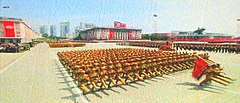
Day of Victory in the Great Fatherland Liberation War
| Day of Victory in the Great Fatherland Liberation War | |
|---|---|
| Korean name | |
| Chosŏn'gŭl | 조국해방전쟁 승리 기념일 |
| Hancha | 祖國解放戰爭 勝利 紀念日 |
| Revised Romanization | Joguk haebang jeonjaeng seungni ginyeomil |
| McCune–Reischauer | Choguk haebang chŏnjaeng sŭngni kinyŏmil |
 Soldiers of the Korean People's Army dressed in Korean War-era uniforms marching through Kim Il-sung Square at the 2013 Victory Day parade. | |
| Observed by | North Korea |
| Significance | Armistice of the Korean War |
| Observances | Ceremonies at the Victorious Fatherland Liberation War Memorial |
| Date | July 27 |
| Next time | July 27, 2025 |
| Frequency | Annual |
The Day of Victory in the Great Fatherland Liberation War (Victory Day) is a national holiday in North Korea celebrated on July 27 to mark the signing of the Korean Armistice Agreement which brought a cease fire to the Fatherland Liberation War (Korean War) that took place in 1950–53; it is referred to as "Victory Day" despite the fact that the war is generally regarded as having ended in a stalemate.[1][2][3] On this day ceremonies are held at the Victorious Fatherland Liberation War Memorial.

History
In 1973, July 27 was designated as the Day of Victory in the Great Fatherland Liberation War. Ceremonies such as central plenary meetings (중앙보고대회, also alternatively translated as national meetings) were done in a small scale only in the 5th and 10th anniversaries.

From 1993 to 1998, central plenary meetings were held annually.

In 1996, during the 43rd anniversary, the day was promoted to the status of a national holiday, which involved raising the North Korean flag and resting for one day. In 1999, central plenary meetings were omitted. From 2000 to 2002, the ceremonies were reduced in size and was mainly run as a cultural athletic event due to the inter Korean summits. In 2003, the size of the ceremonies increased due to international tensions and nuclear crisis.[4]

See also
References
- ^ "North Korean Soldiers Steal from Civilians to Celebrate End of Korean War". Radio Free Asia.
- ^ 조국해방전쟁 승리의 날 [Victory in the Fatherland Liberation War Day] (in Korean). Archived from the original on 2014-10-11.
- ^ Se Young Lee; Maxim Duncan. "Kim Jong Un visits war graves ahead of North Korea's 'Day of Victory'". NBC News. Retrieved 16 September 2014.
- ^ "'조국해방전쟁 승리 기념일' 50주년 관련 동향". Retrieved 2012-04-15.
See what we do next...
OR
By submitting your email or phone number, you're giving mschf permission to send you email and/or recurring marketing texts. Data rates may apply. Text stop to cancel, help for help.
Success: You're subscribed now !
